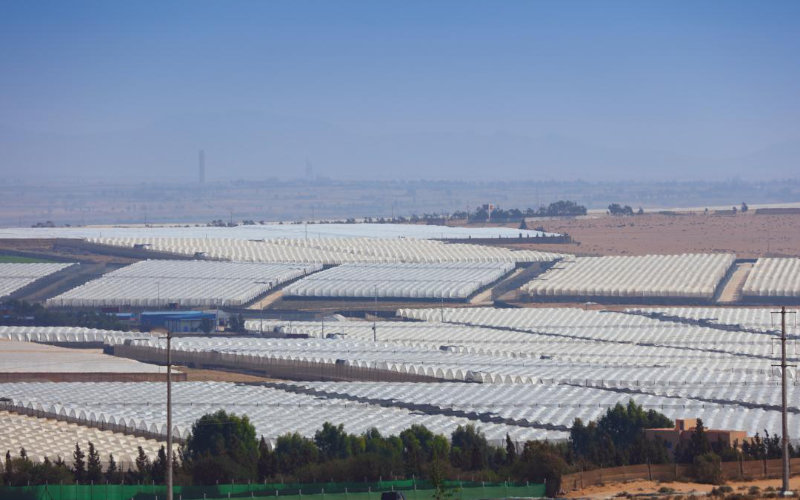Morocco’s Agricultural Boom: Spanish Investors Fuel Desert Greenhouse Expansion

After signing the free trade agreement with the United States in 2004-2005, Morocco attracted foreign investors to exploit part of its agricultural land. A windfall seized by many Spanish companies, thus contributing to the development of the primary sector of the kingdom.
"The Moroccan agricultural model that has triumphed and in which it is now strong is a copy of the semi-desert part of southern Spain and also shares its problems. The Souss Valley area, where most of the crops are concentrated, follows the Almeria model. Large greenhouses in the middle of the desert and near the sea, where tomatoes, peppers, green beans, cucumbers, etc. are grown," explains Tomás García Azcárate, researcher at IEGD-CSIC and agricultural economist.
On Google Maps, the resemblance between the Souss Valley in southwest Morocco and El Ejido in Almeria is striking, says El Confidencial. Since the trade agreement with the EU in 2012, Morocco has considerably increased its production of fruits and vegetables. According to ICEX data, 30 Spanish companies out of the 300 established in Morocco are investing in the agricultural sector. This area, close to the port of Agadir, attracts the subsidiaries of Abengoa, CaixaBank and Perichan, one of Mercadona’s main suppliers of fruits and vegetables.
Since the beginning of the last decade, these Spanish companies have started to encounter problems in Morocco, including strikes by Moroccan workers on the plantations demanding better working conditions, the Covid-19 crisis, and the latest severe drought that has hit the kingdom for the past three years. All these crises are affecting the yield of Spanish producers in Morocco, reports García Azcárate, who is aware of Morocco’s weight in global fruit and vegetable exports.
"It is clear that Morocco is competing and harming an economy like ours, which is clearly export-oriented and favorable to trade. But it is no different from many other sectors in which countries with lower costs are trying to conquer markets by taking advantage of their cards. We talk about unfair competition, but it is a criminal offense that must be proven," he explains, also noting that the arrival of Moroccan tomatoes on the EU market has caused Spain to lose its hegemony.
Related Articles
-

Algeciras Port Strike Averted: Marhaba Operation Saved for Moroccan Travelers
17 July 2025
-

Barcelona Man Arrested: Alleged Leader of Anti-Immigrant Group Planned "Hunts" Against Moroccans
17 July 2025
-

Morocco Reignites Tensions: Ceuta and Melilla Liberation Group Resurfaces Amid Border Customs Closure
16 July 2025
-

Violent Clashes Erupt in Spanish Town as Tensions Rise Over Immigration
14 July 2025
-

Mega-Tunnel to Bridge Continents: Spain and Morocco’s 60km Gibraltar Link Set to Revolutionize Euro-African Trade
13 July 2025